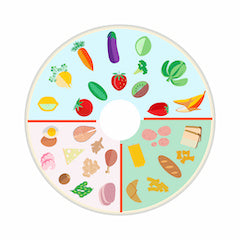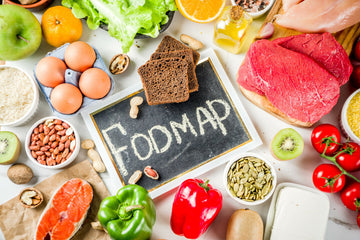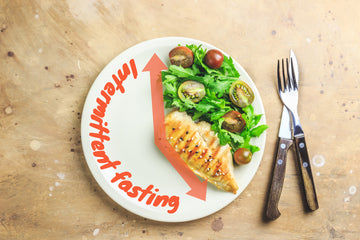by Anthony Benjamin on Oct 12, 2022

4 Ways to Portion Control During the Holiday Season
It’s the holiday season, which means it’s time to enjoy all our favorite comfort foods.
Pumpkin pie, macaroni and cheese, mashed potatoes, and more all make it onto our plates, and
often, we don’t think twice about eating it all. However, practicing portion control is key
for those who want to maintain their health and enjoy the festivities. It doesn’t mean we
don’t get to enjoy anything. It just means that we have to watch how much we indulge in
sugary and fatty treats. Keep reading to learn four ways to portion control this holiday
season.
Take Your Time
Monitor how fast you eat. Slow down your chewing, pause in between bites, and move more slowly when reaching for a roll or that second piece of turkey. Once you start eating, it takes about 20 minutes for your brain to process that there is food in your stomach. By slowing down, it helps your gut and brain work together. If you eat too fast, in 20 minutes, you might be so full you’re uncomfortable. Allow your body to catch up to your actions so you can experience the physical cues to stop eating before you’ve overconsumed.
Practice Mindful Eating
Eating slowly is just a part of mindful eating. When you are mindful, you are as fully aware of the present as possible. When you are eating mindfully, pay attention to your five senses. How does the food make you feel? You might be thinking this sounds crazy, but it’s based on science and dialectical behavioral therapy (DBT), which is often used to treat eating disorders. Mindfulness is a core DBT skill. Mindful eating helps you examine your thoughts, feelings, and internal pressures that affect how and why you eat. Remind yourself of why you’re eating this holiday food. Remind yourself that you don’t need multiple servings to enjoy it. Listen to what your body tells you, and stop once you feel satiated. For more on mindful eating, check out our CrowdCast Channel and “Mindful Eating”!
Drink Water
A good rule of thumb is to drink a glass of water 30 minutes before or after your meal. As many bariatric patients know, you should aim to drink about two liters of water a day. This can be difficult when you can’t drink anything during your meal but stay mindful, and you should reach that goal. Staying hydrated does many good things for the human body. Did you know that the human body often confuses thirst for hunger? Sometimes, the easiest way to curve “hunger” is to drink a glass of water. So, if you’re adequately hydrated, odds are you’re eating less. Being dehydrated is more common than you think. On average, 75% of Americans are chronically dehydrated. Hydration is great because it can boost metabolism by 30%. Staying hydrated this holiday season also means watching how much alcohol you consume. We know that alcohol consumption is not recommended for patients because it contains no nutrients and can stimulate appetite. However, that doesn’t mean you can’t indulge in other holiday drinks. Avoid full-fat milk in things like coffee and hot chocolate. Avoid carbonated drinks as this may cause you some discomfort. Stay hydrated and happy this holiday season by checking out our CrowdCast Channel and “Hydration and Why it’s so Important!”
Manage Your Plate
For starters, you should use a smaller plate. Using a smaller plate makes your portion sizes look larger, tricking your brain into thinking that you’re consuming more food than you are. You should also take care to notice how much of each food group you are putting onto your plate. Always start with vegetables, and make sure they take up at least half of the plate. Vegetables are high in fiber and are water-dense but low in calories, meaning you’ll feel fuller quickly without all the guilt. Don’t worry; you’ll still have room for all the other foods you want a taste of. They just won’t overwhelm your plate.
You should reserve the second largest part of your plate for lean meat. If there is an option, go for something that has been baked or grilled rather than fried. If it makes things easier, your lean meat portion should be the size of a deck of cards. If you are only a couple of months out from bariatric surgery, you may find that focusing on lean protein to be more beneficial to your recovery. That’s okay! Simply swap out some of the carbohydrates with some more lean meat. You should aim to receive about 55 to 80 grams of protein a day following bariatric surgery. We also recommend keeping your vegetable intake high, as they are excellent sources of various vitamins and minerals.
Once you have the essentials, you can jump into the carbohydrates! In general, a serving size of stuffing or mashed potatoes is about ½ cup. Keep that in mind as you grab a bit of each. If you would like to learn more about managing your plate, head to our Crowdcast Channel and “Making Your Plate.”
Why Portion Control Is Important
Portion control is essential not just for the holidays but all year round. After bariatric surgery, your diet isn’t just another fad you’re trying; it’s a lifestyle. It’s vital that your form good eating habits now, or else you’re setting yourself up for failure down the line. Make sure to measure out your portion sizes, as this will help keep you accountable for how much you’re putting on your plate. It’s also essential that you eat three meals a day. Eating a proper-sized meal three times a day will help prevent you from “grazing” or snacking throughout the day. Some bariatric patients find that they must consume 1,000 calories or less to maintain weight loss. Make it easier by eliminating the urge to snack. Another reason why bariatric patients must practice portion control is to avoid dumping syndrome.
Avoiding Dumping Syndrome
Dumping syndrome occurs when undigested food is “dumped” from the stomach directly into the small intestine. There are two types of dumping syndrome, early and late. Symptoms of early dumping syndrome will typically occur 10 to 30 minutes after you eat, while the symptoms of late dumping syndrome won’t flare up until one to three hours after you’ve already eaten. Symptoms may include diarrhea, pain, nausea, dizziness, and hot flashes or cold sweats. To avoid dumping syndrome, you can:
- Drink liquids 30 minutes or longer after your meal; drinking at meals can push the solid food through your stomach pouch more quickly
- Drink non-carbonated fluids; the carbonation can stretch your pouch, allowing it to hold more food than is healthy
- Divide your daily caloric intake into six small meals
- Lie down after your meal for 30 minutes
- Choose whole grains over white flour and sugar
- Add more protein to your meals
- Stop consuming dairy if it is exasperating the problem
For more tips on practicing portion control this holiday season, take a look at our CrowdCast Channel and “Portion Perfection with Holiday Tips!”
Shop With ProCare Health
Are you tired of looking for delicious substitutes for your favorite treats? ProCare Health offers many tasty treats packed full of different vitamins and minerals that are perfect for bariatric patients looking to get their daily value of necessary nutrients. Try some of our products, like:
- Calcium Dark Chocolate | 500 mg Calcium | 500 IU Vitamin D
- Calcium Soft Chews
- Z-Pro 25 | Meal Replacement Protein
Visit our website today to see what else we have to offer!

How the Low FODMAP Diet Is Good for Gut Health

What Is Food Noise?


